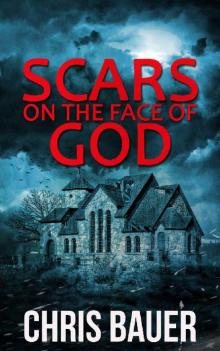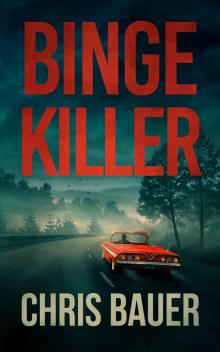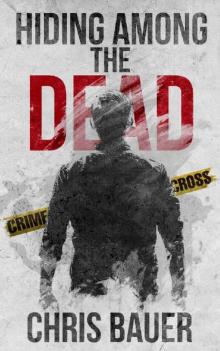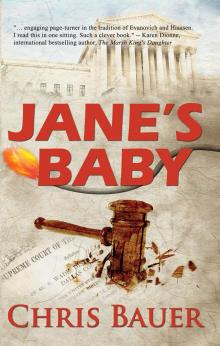- Home
- Chris Bauer
Scars on the Face of God
Scars on the Face of God Read online
Scars on the Face of God
Chris Bauer
Copyright © 2008 by Chris Bauer.
All rights reserved.
No part of this book may be reproduced in any form or by any electronic or mechanical means, including information storage and retrieval systems, without written permission from the author, except for the use of brief quotations in a book review.
Published by Severn River Publishing.
Contents
Also by Chris Bauer
Prologue
Chapter 1
Chapter 2
Chapter 3
Chapter 4
Chapter 5
Chapter 6
Chapter 7
Chapter 8
Chapter 9
Chapter 10
Chapter 11
Chapter 12
Chapter 13
Chapter 14
Chapter 15
Chapter 16
Chapter 17
Chapter 18
Chapter 19
Chapter 20
Chapter 21
Chapter 22
Chapter 23
Chapter 24
Chapter 25
Chapter 26
Chapter 27
Chapter 28
Chapter 29
Also by Chris Bauer
Thanks for Reading
Hiding Among the Dead
HIDING AMONG THE DEAD: Chapter 1
HIDING AMONG THE DEAD: Chapter 2
HIDING AMONG THE DEAD: Chapter 3
Read Hiding Among the Dead
Author’s Note
Acknowledgments
About the Author
Also by Chris Bauer
Scars on the Face of God
Hiding Among the Dead
Jane’s Baby
Sign up to get exclusive access to updates, special offers, free books and new releases from Chris Bauer and the SRP Mystery & Thriller Team. ChrisBauerAuthor.com/Newsletter
To Terry, whose childhood was the closest thing to an orphan’s without her being one.
Prologue
April 1909, Schuetten, PA
We heel-toed our way through the kitchen, all moon-shadowy dark this early in the morning, me first, Heinie following real close, past the hearth and the three stoves and around the two butcher-block islands, over to a covered bin. I held the lid open so Heinie could pull out two empty potato sacks. Sister Irene would be up at six to make the oatmeal, so we had an hour.
Heinie was a skinny kid who said he was a full eight years old but I was sure he weren’t a speck over seven. The nuns picked him up last year the day after my ninth birthday, after someone seen him wandering the bungalows eating from garbage pails in the middle of the night. His mother was dead on account of she froze stiff in a snowdrift outside the hotel taproom. His father was a tannery worker, except Heinie said his mom never knew which one. I cut him in on a good deal only because he had the guts to lie to me about his age.
“Them dogs been crapping two full days since we last been out,” I said, my voice low. “Let’s go make us some money.”
I tugged at the knob of the heavy back door with both hands till it pulled open. In seeped a door full of night mist that settled thick and heavy on us, tickling my nose with the smell of drying creek mud and plants that rotted in it. We looked through the screen door into the grayness, all mixed in with dark swirls left over from a rain we got overnight.
“Looks creepy outside,” Heinie whispered, his eyes big as all-day suckers.
“Night fog,” I said. “Came up from the river. That’s all it is.”
“Yeah, but how do we tell the difference if there’s ghosts out there?”
I unhooked the screen door latch and told him to quit bellyaching, then I pulled him outside by the shoulder when he didn’t move. We stayed under the overhang of the back porch, potato sacks in our hands, me listening to crickets and frogs, him listening to who knows what. A full moon played peekaboo behind the clouds until it poked itself through and lit up the backyard. The shadowy mist that surrounded the orphanage was now crawling down the slope. If there were any ghosts mixed in there with it, they were heading back to the river.
I hopped down the steps, reached my hand under the porch floorboards, and pulled out two wooden spoons from a ledge. Time to get to work.
First stop was the Schuetten Hotel, opposite side of the road from the orphanage and down a bit, around a bend lined with maple trees. Pale yellow shingles, brown trim, and four rounded corners that looked like small grain silos with windows. Real pretty in the daytime, but now it was all tan and gray, the only light on it coming from the moon. Out front of the hotel the shingles had a shine to them, sparkled up some since this was where the town cobblestones began. Sister Irene said folks often traded in their country smarts for city smarts once they stepped off the dirt and onto the brick, and weren’t it too bad their common sense didn’t always tag along for the trip.
A puddle of muddy rainwater made trickle-drip noises as it ran through a black iron sewer grate set flat in the cobblestone out front of the hotel. Heinie and me stepped around the grate, our eyes on the empty spaces between the bars, spaces I knew were wide enough for cats and other small critters to fit through if they got pushed hard enough, ’cause I seen it done. We tiptoed past, listening for noises different than the trickle-drips, heard nothing else from underneath. We quickened up again till we were on hotel property.
We started at the far end of the back lawn and moved silent through the grass, our eyes to the ground while we worked our way toward the hotel porch, bending, standing, bending, standing, careful where we tread. This time of year the sun got up about the same time Sister Irene did. A good thing, seeing as how the hotel owner wanted us to work when it was mostly dark and his guests were still asleep. Heinie spied a large pile a few feet ahead of him and hurried his skinny legs to get to it.
Uh-oh. Oopsy-daisy.
“Johnny,” Heinie whimpered. “Aw, Johnny, help me.”
Heinie’s lace-up shoes were a size too big for him, so when his potato sack dragged underneath them the little goof’s legs got all tangled up between burlap and leather. He pushed himself up from the dew-soaked grass. The right side of his face was now a brown smear. I got him to his feet.
“Pick up the shit with your spoon,” I told him, “not your face. Hold still.” Heinie held his nose and gagged, still not used to the dog-shit business. With a few swipes of my spoon, I scraped off most of what was on his face. I untucked my shirt and ripped off the tail, then used it to wipe the rest of the mutt cake off his cheek.
On the hotel’s back porch a rocking chair squeaked over a loose floorboard, then stopped its slow back-and-forth. The person sitting in it struck a match, his smooth dark face lighting up behind the flame as he pulled hard at his pipe, the match held fast to the bowl end. Fat Cookie worked in the hotel’s kitchen.
“Thanks, boys,” Cookie said through little puffs of smoke. “The coins is where they always is.” He snapped shut his pocket watch, then went back to his rocking. “Better hustle yourselves up. Forty minutes till your oatmeal.”
I sneaked up on a lawn angel that was really a stone birdbath and quick snatched the pennies out of her hand. I waved Heinie into the underbrush; we left the hotel property through a separation in the trees.
We doubled back across Schuetten Pass Road and came up on the church rectory’s lawn. Monsignor owned two well-fed bullmastiffs, and with all the crapping they did, the town strays took to dumping here, too. His dog stuff stayed right where it was, all except for a few chunks I flicked into the open window of his horse carriage. I never much liked the monsignor.
On the other side of the maples we sl
ipped onto the grounds of the Volkheimer bungalows, one-story shacks with black-and-white smoke curling out their stovepipes, their front and back doors under hand-painted hex signs supposed to protect the people inside. From what, I never fully understood, but around here there were hex signs everywhere, on shacks and barns and stables, even outdoor privies, except most all the signs were faded and flaking off the curled-up wood they’d been painted on. About fifty German families lived here, the shanties spread out north and west across the railroad tracks along the upper tip of town, and didn’t none of them families ever talk much about them hex signs, least not to us orphans or other outsiders.
“Old charms for old evils” was how Fat Cookie once put it, one outsider to another. “Can’t rightly say them signs been much help to these folks lately.”
Heinie and me traipsed two rows inside the settlement and stepped onto a small square grass patch we hadn’t had time to police the last few days. Hot damn. Pay dirt.
We worked the area same as we worked the hotel lawn. A stray came out of nowhere, a rammy little brown-and-white rat terrier that chased us the last time we came through. He leaped onto the back of Heinie’s leg, started getting all pecker-happy with it. I grabbed the mutt by his tail and tossed him a good five feet, enough so Heinie and me could get a running start. The rat-dog landed and spun like he was ready to come at us again, except something stopped him; he stiffened on all fours. His bulging terrier eyes narrowed and he growled low like a cornered raccoon, his upper lip curled and showing teeth sharp enough to do what rat terriers been known to do, which was clamp onto and rip apart a rat’s head.
“Back up, real slow,” I told Heinie.
The hair on the mutt’s neck and shoulders rose. It was then I seen something I’d never seen a ratter do before: He took a backward step. He snapped once then stiffened again.
“He’s gonna bite, Johnny.”
“No, he won’t. He’s too scared. Keep moving.”
“Scared? Ratters don’t get scared. Scared of what?”
Behind us I heard a moan. We turned, and on the other side of the grass patch in the moonlight we saw a privy with its door open. Two bare legs were spread apart half in the privy and half out with a tumble of lady’s nightclothes above a pair of bent knees, the two bare feet attached to them legs digging their heels into a black mudhole just outside the door. Her feet lifted out of the muck and into the privy’s shadows, then slapped against the inside of the doorframe on both sides, the wood creaking against the weight. Another moan told me this was for sure a girl or a lady in pain, with grunting low and deadened like her teeth were sunk into cloth. A few seconds later she squealed bad as if she was being split in half. The ratter kept his distance, growling and snapping until the lady quit her screaming and settled into another low moan. The terrier whimpered, then turned tail and took off. Heinie and me were right behind him.
The dog found shimmy space under a garden shack, but me and Heinie kept running till we got outside the bungalows, onto the path that went north, next to the foggy Wissaquessing River. The river was all swelled up and noisy as a rainstorm on account of the dam from the lake was open. A covered footbridge wide enough for buckboards and horseless carriages to pass each other took us across the river and emptied us onto the Volkheimer fairgrounds. Five minutes past the fairgrounds, we were on tannery property.
Knock knock. The brown metal door swung inward, its hinges squealing like scattering mice. A face rimmed with a blond beard appeared on the other side of the screen door.
“Goot morning,” the Dutchman said. “Chust in time, boys.” We stepped a few feet inside the door and dropped our sacks onto a cart. Heinie crinkled his nose from the smell.
“Wer da, Herr Glocker?” came from across the room, the other side of the tannery’s gurgling vats. It was Mr. Volkheimer’s voice, except Mr. Volkheimer didn’t show himself.
“It’s Dogshit Johnny,” the Dutchman answered, “und his apprentice.”
The Dutchman cinched my potato sack shut and raised it off the cart a few inches to check the weight by hand, then did the same with Heinie’s. His eyebrows arched in our direction until a smile sneaked out through the machine grease on his beard.
“Vait here, fellas,” he told us, then he pushed the cart over to a water vat the size of a circus trampoline and emptied our sacks into it. When he got back he laid out our earnings on a worktable. Five pennies each, plus two shiny red apples.
“From Herr Volkheimer,” the Dutchman said and turned us around by our shoulders so we were facing a washbasin. “Now clean your hands and spoons real goot then raus mit uch. If you hurry, you can make it back to the orphanage in time for your breakfast. Und Herr Volkheimer says stay out of trouble.”
Heinie and me skipped down Schuetten Pass Road, kicking up dust and stones while we ate our apples, me poking fun at him. “Shoulda seen your face with that dog shit all over it. I thought you were gonna puke.”
“Wish you wouldn’t talk about it, Johnny,” Heinie said, his mouth full, “else I’ll upchuck this here ap—”
“Shhh.” I stopped him with a hand on his shoulder and pointed through the line of maples to another covered bridge. “Look.” We hurried over to a tree and poked out our heads from behind its trunk.
The fog was gone, and on the wide dirt path worn into the hillside was a lady in nightclothes wobbling past us, on her way down to the bridge. Seen men stumble out of the taproom walking straighter than her, each of them knowing where they wanted to go but the knowing not helping them much. In the crook of her arm was a bundle that looked like a fat cigar but was near as big as a market-day satchel. Her nighttime bedclothes were unbuttoned halfway up, her white legs slimy-wet in the moonlight, her bare feet caked brown with road dirt. It was her heels that were the filthiest, like they’d been dipped in pig flop. No, more like they’d been dipped in—
Yeah. The black mud that collected outside privies.
The bundle squirmed and mewed inside the cocooned blanket as she reached the bridge. She steadied herself by leaning against the bridge tunnel’s framing, then disappeared inside.
We waited for her to step out of the tunnel, onto the river’s other bank. The sun pushed over the hill, the inky sky now turning blue as a baby blanket, the trees poking out of the smoky-black night with long shadows attached to their trunks, including the one me and Heinie were tucked behind. Heinie whispered, “Where’d she go?”
I shrugged. We poked our heads out to see better, our eyes watching both sides of the bridge. On our end the tunnel was shadowy-dark as a cave, its opening under another faded hex sign. More waiting.
The bridge window over the middle of the river flipped back on squeaky hinges, making us both jump. I squinted, the window now a black square in the bridge’s scuffed red wall, nothing moving inside it. Suddenly two arms split the window’s darkness and heaved the fat cigar bundle through it like it was bathwater getting tossed off a back porch. The bundle splashed into the choppy river and didn’t come back up. The window stayed open.
“Must be kittens, huh, Johnny? Want to fish them out?”
“Nope. River ain’t safe when the dam’s open.”
The river swallowed up the bundle and didn’t seem no worse for it, Heinie and me still staring at the water’s shiny twinkle-star surface like we’d been hypnotized. Suddenly a loud pop jolted us both, scattering squirrels and scaring the chirping songbirds out of the maples along the bank. A tiny puff of smoke drifted from the open window, and it was then I knew for sure the lady wouldn’t be coming out either end of the tunnel. Go, I told myself. Run.
The bundle the lady tossed into the river bobbed to the surface before I could move. Wasn’t more than a second before we heard it crying, then it went under again.
“Johnny, that ain’t no cat! It’s—”
Whatever Heinie said after that I never heard since my cap and shoes were already off and I’d gone over the side of the bank, into the chop. The river was maybe six feet deep in the mid
dle, but I was only four-ten, so it might as well been a mile. Water was cold and rough yet with all the runoff it was mostly clean, at least near the top. I took a deep breath, closed my mouth, and ducked under the surface.
I wasn’t ready for what I was hearing, or thought I was hearing: a crying baby, clear and strong as a hungry newborn in the orphanage nursery, screaming like it was right next to me, like its little arms were waving around, looking to be picked up, but—
I was underwater so the crying shoulda sounded different, shoulda sounded like gurgles and glugs from when you swallowed too much lake water except it didn’t and I was getting scared and—
…the river bottom, filthy, not able to see—
…found something, cloth against my hand.
…other babies were down here, I could hear them, they were screaming.
…they needed to stop. All them screaming babies needed to stop—
On the bank me and Heinie leaned over the bundle. It wasn’t making no more noise.
“Pull the blanket off his face, Johnny.”
I was shivering too much. Besides, I figured it was dead already. “You do it.”
“Okay. One, two…”
Heinie pulled at the blanket but didn’t say nothing after that, his voice stuck inside a scream.

 Zero Island (Blessid Trauma Crime Scene Cleaners Book 2)
Zero Island (Blessid Trauma Crime Scene Cleaners Book 2) Scars on the Face of God
Scars on the Face of God Binge Killer
Binge Killer Hiding Among the Dead
Hiding Among the Dead Jane's Baby
Jane's Baby